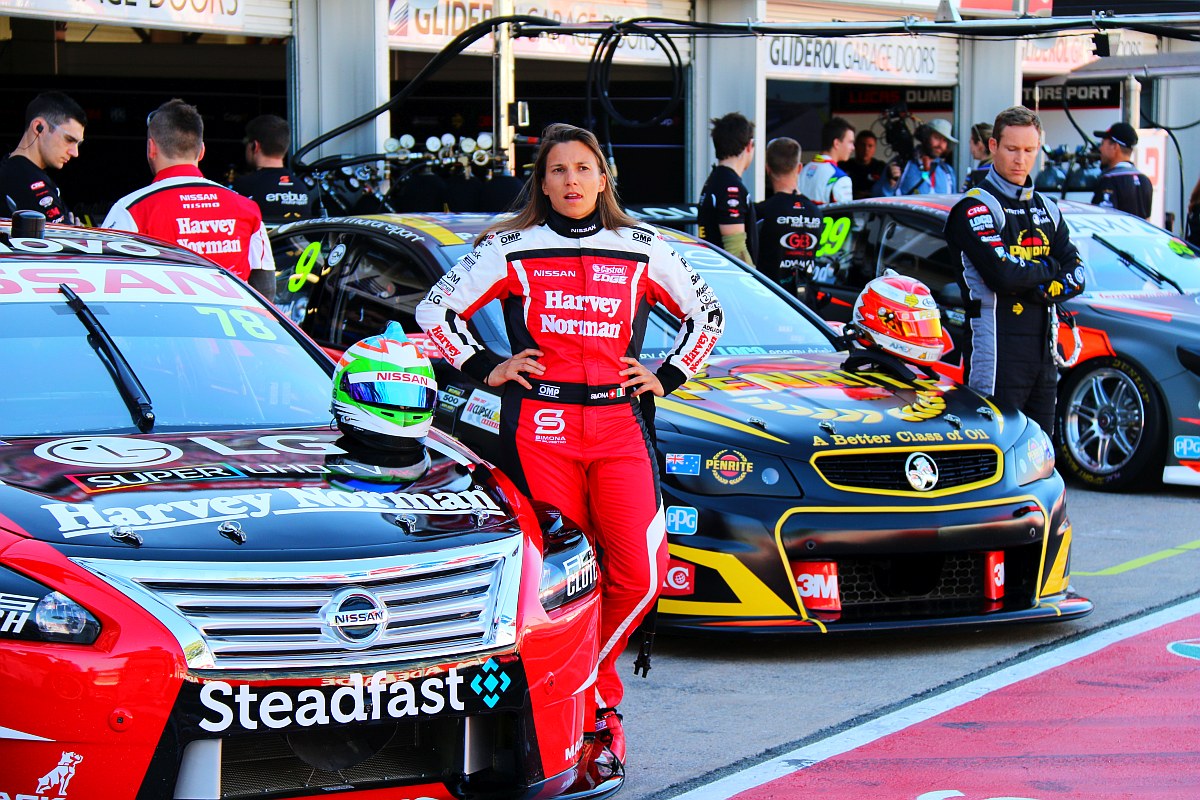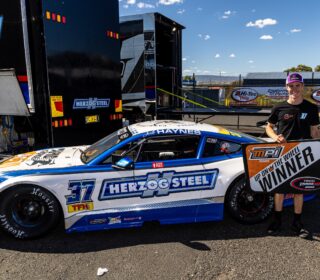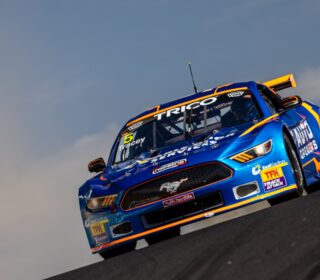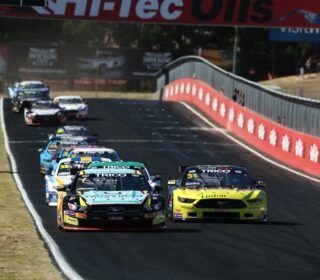CRAILL: RACING? SURE.. BUT WHAT ABOUT RACE?

THE front-and-centre issue of racism in Australian sport reared its ugly head again last fortnight, when the Port Adelaide-versus-Adelaide showdown at the Adelaide Oval was marred by supporters hurling racist taunts at indigenous players Eddie Betts and Paddy Ryder.
The incredibly disappointing incident, that in ensuing week resulted in a strong response from both clubs and the AFL and sanctions (up to and including police charges) for those responsible, took the gloss off what was otherwise a remarkable sporting showpiece and one of the great rivalries in Aussie sport.
It also exposes motor racing to a delicate area the sport, at least here, has not yet been forced to deal with in public.
While the ball codes have become experts (though some would argue against the use of that term) in dealing with racism against players from supporters, Australian Motor Sport has been isolated from that as an issue.
In fact, relative to other sports our game can hold it’s head high as a true leader in inclusiveness and equality, alongside it’s hallmarks of innovation and forward-thinking.
While the recent success of the stand-alone Women’s Big Bash League and the AFL-W competitions has been hailed in the media, Women have been racing equally against men for decades. Names like Christine Gibson, Sue Ransom and more lately Leanne Tander, Renee Gracie and Chelsea Angelo have made their respective marks in Australia.
Last year Molly Taylor and Leanne Tander both won national championships which is an outstanding achievement, in that it is incredibly difficult to win a national championship no matter whom you are.
Overseas, Susie Wolf and Danica Patrick are well-known to those in the industry and outside it.
Of course, this year Simona de Silvestro is one of only 26 full-time drivers in the Supercars Championship, racing equally against 25 other drivers who just happen to be men.
In the heat of a race, now more than ever gender plays a negligible role in making a car go quickly. It is the number one thing our sport has over the others, and at the same time is something they are unlikely to ever match.
While de Silverstro can race wheel-to-wheel with Craig Lowndes in Supercars, the chance of Elyse Perry bowling to Glenn Maxwell in the Big Bash league next Summer seems nigh on impossible.
Then there’s the remarkable development the sport has enjoyed over the years in technology, road-vehicle relevance, safety and efficiency.
It is very easy to create a very strong argument for the affirmative that the sport has seriously influenced the cars we drive on the road today, potentially saving millions of lives.
And while Footy is a wonderful thing, it can’t claim any of that.
Motor Racing in this country also benefits from the fact that is a truly international sport – we’re used to seeing Australians compete with drivers from all walks of life, race, creed or religion and we accept it as a fact of life. No one gives two hoots that Simona is from Switzerland nor the fact half the field seems to be from New Zealand – jokes about their accent and national sporting prowess aside.
And yet the consistent racism issues within domestic sport leave us sitting with what I think is a need to acknowledge the fact that the sport has a very tiny percentage of participation from Indigenous Australians, which to this point has sheltered the sport from the kind of issues faced by the AFL this week.
In that we are at the same time extremely fortunate and extremely unlucky.
Fortunate in that it means we avoid the dramas the other codes face, and unlucky in that we can not call our sport truly diverse until there is a time that we are challenged with, and grow from, a situation like what unfolded in the footy world last week.
In Australia we have not yet had to face that challenge in our corner of the sporting landscape which means as an industry, we’ve not been educated on the issue and been forced to sit and openly discuss it as the footy codes have.
Of course, I’m not stupid enough to believe Motor Sport is immune to racism.
Lewis Hamilton was famously racially taunted by fans in Spain in 2008 and again a few years later, the locals inexcusably spurred on by the Briton’s rivalry with local hero, Fernando Alonso.
“I am a little bit surprised when they say race has nothing to do with the sport. Formula One is a white-dominated sport. You haven’t seen any black athletes till now, have you?” Hamilton told Indian daily The Hindustan times in a 2013 interview, prior to that year’s Indian GP.
“I mean there have been a couple of Indians who have come and broken that barrier, and now in every sport throughout the world, that’s how it has been. Tiger [Woods] came in and broke that barrier and now you have people from different cultures who are getting into golf, and the same is the case with karting and racing; and that is great I think.”
Well-known and respected two-wheeled writer Matt Oxley noted the inherent racism in the MotoGP paddock in an eye-opening 2015 editorial for Motor Sport Magazine, commenting that: ‘A few years ago I heard a factory MotoGP rider say the words, “the older I get, the more racist I get”. I know a factory MotoGP team owner whose derisive term for all journalists was “press n*****s”.’
In America, Willy T. Ribbs was famously troubled by the anti-black approach from the NASCAR’s Southern Roots while Wendell Scott, who became the first African-American person to win a NASCAR Grand National race, was at times flat-out denied the chance to compete by the governing body in the early 1950s.
ESPN’s amazing 30 for 30 documentary series profiled Scott’s story in a compelling and moving story about his struggle for acceptance a few years ago, and it makes for sobering viewing. His posthumous inclusion into the NASCAR hall of fame in 2015 indicated the slow shift towards acceptance by the ‘good ‘ol boys’.
These are but a few incidents of what I’m sure are enough to fill several large novels on the subject.
But in our corner of the world, we are at the moment relatively immune from such dramas.
While there’s the occasional taunt from the blokes on the hill about Kiwi’s and sheep, or an unfortunate uttering of a now-famous term about ‘wagons’ at Bathurst two years ago which brought the sexism debate front-and-centre, our sport remains relatively clean – at least on the surface – from being afflicted with this most serious of issue.
Our athletes generally act with a remarkably high level of professionalism that makes them unbelievably good role models for young people who follow the sport. They should be applauded for that.
But one day it will be a challenge the sport will have to face.
We can not be so blase’ to expect that our industry is not rife with the potential for this to become an issue.
One day there will be a driver of Indigenous Australian descent, or from somewhere else entirely, who will make the top levels of the sport and attract scrutiny from the media and paying punters.
And one day, one stupid person is going to cross a line that should never be crossed and bring the discussion of race into Australian Motor Sport.
We enjoy and celebrate women racing equally with men. We can appreciate international drivers from all walks of life. We can deal with drivers of different religious belief competing equally and we can advance and enhance the sport by learning from tragic accidents that claim or damage lives.
But how our sport in Australia deals with a racism incident not unlike what the AFL has this week will be the next true test of just how really inclusive our game is, especially when compared to all the others.
Forget market relevance, dealing with a declining, separating fan base or politics about overseas races..
I believe this may well be the biggest challenge the sport ever faces.
Are we ready?
WORDS: Richard Craill
IMAGE: Mark Walker







